-
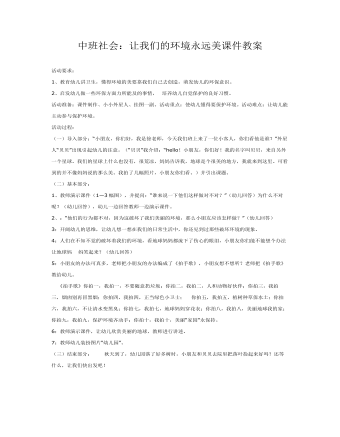
中班社会:让我们的环境永远美课件教案
2、启发幼儿做一些环保方面力所能及的事情, 培养幼儿自觉保护的良好习惯。活动准备:课件制作、小小外星人、挂图一副。活动重点:使幼儿懂得要保护环境。活动难点:让幼儿能主动参与保护环境。活动过程:(一)导入部分:“小朋友,你们好,我是徐老师,今天我们班上来了一位小客人,你们看他是谁?”外星人“贝贝”出现引起幼儿的注意。(“贝贝”我介绍:“hello!小朋友,你们好!我的名字叫贝贝,来自另外一个星球。我们的星球上什么也没有,很荒凉,妈妈告诉我,地球是个很美的地方,我就来到这里。可看到的并不像妈妈说的那么美。我拍了几幅照片,小朋友你们看。)并引出课题。(二)基本部分:1、教师演示课件(1—3幅图),并提问:“谁来说一下他们这样做对不对?”(幼儿回答)为什么不对呢?(幼儿回答),幼儿一边回答教师一边演示课件。2、:“他们的行为都不对,因为这破坏了我们美丽的环境,那么小朋友应该怎样做?”(幼儿回答)
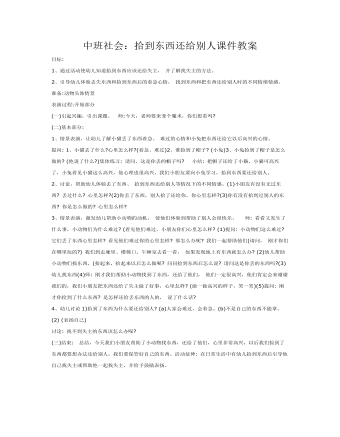
中班社会:拾到东西还给别人课件教案
2、引导幼儿体验丢失东西和捡到东西后的着急心情,找到东西和把东西还给别人时的不同情绪情感。准备:动物头饰情景表演过程:开始部分(一)引起兴趣,引出课题。 师:今天,老师要来变个魔术,你们想看吗?(二)基本部分:1、情景表演,让幼儿了解小猫丢了东西着急、难过的心情和小兔把东西还给它以后高兴的心情。提问: 1、小猫丢了什么?心里怎么样?(着急、难过)2、谁捡到了帽子? (小兔)3、小兔捡到了帽子是怎么做的? (他说了什么?)集体练习: 请问,这是你丢的帽子吗?小结: 把帽子还给了小猫,小猫可高兴了,小兔着见小猫这么高兴,他心理也很高兴,我们小朋友要向小兔学习,拾到东西要还给别人。2、讨论,帮助幼儿体验丢了东西、拾到东西还给别人等情况下的不同情感。(1)小朋友有没有无过东西? 丢过什么? 心里怎样?(2)你丢了东西,别人拾了还给你,你心里怎样?(3)你有没有拾到过别人的东西? 你是怎么做的? 心里怎么样?
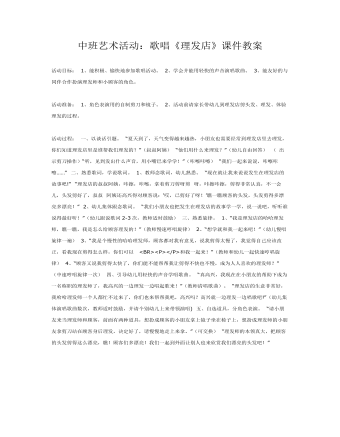
中班艺术活动:歌唱《理发店》课件教案
活动准备: 1、角色表演用的自制剪刀和镜子。 2、活动前请家长带幼儿到理发店剪头发、理发、体验理发的过程。活动过程: 一、以谈话引题。 “夏天到了,天气变得越来越热,小朋友也需要经常到理发店里去理发,你们知道理发店里是谁帮我们理发的?”(叔叔阿姨) “他们用什么来理发?”(幼儿自由回答) (出示剪刀操作)“听,见到发出什么声音,用小嘴巴来学学!”(咔嚓咔嚓) “我们一起来说说,咔嚓咔嚓……” 二、熟悉歌词,学说歌词。 1、教师念歌词,幼儿熟悉。 “现在就让我来说说发生在理发店的故事吧!” “理发店的叔叔阿姨,咔擦,咔嚓,拿着剪刀剪呀剪 呀,咔擦咔擦,剪得非常认真,不一会儿,头发剪好了,叔叔 阿姨还高兴得对顾客说:‘哎,已剪好了呀!’瞧一瞧顾客的头发,头发剪得多漂亮多漂亮!”
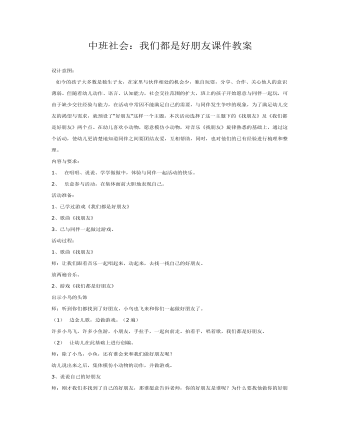
中班社会:我们都是好朋友课件教案
内容与要求: 1、 在唱唱、说说、学学做做中,体验与同伴一起活动的快乐。 2、 乐意参与活动,在集体面前大胆地表现自己。 活动准备: 1、已学过游戏《我们都是好朋友》 2、歌曲《找朋友》 3、已与同伴一起做过游戏。 活动过程: 1、歌曲《找朋友》 师:让我们跟着音乐一起唱起来,动起来,去找一找自己的好朋友。 放两遍音乐。 2、游戏《我们都是好朋友》 出示小鸟的头饰 师:听到你们都找到了好朋友,小鸟也飞来和你们一起做好朋友了。 (1) 边念儿歌,边做游戏。(2遍) 许多小鸟飞,许多小鱼游,小朋友,手拉手,一起向前走。拍着手,唱着歌,我们都是好朋友。
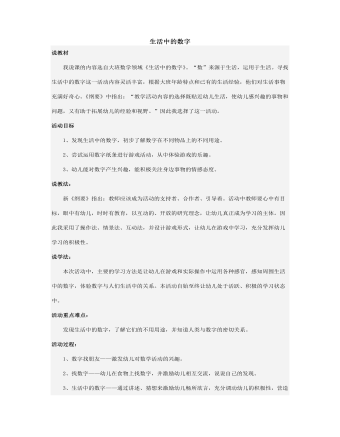
生活中的数字说课稿
1、数字找朋友——激发幼儿对数学活动的兴趣。 2、找数字——幼儿在食物上找数字,并激励幼儿相互交流,说说自己的发现。 3、生活中的数字——通过讲述、猜想来激励幼儿畅所欲言,充分调动幼儿的积极性,营造轻松愉悦的氛围,拓展幼儿已有的生活经验。 4、幸运号码——通过游戏发现数字的趣味性和丰富性,从而更真切的体会数字的神奇,随便的调换数字的位置就可以排成不同的数字组合。 5、设计电话号码——幼儿运用已有的知识解决问题,为自己编电话号码。让没个幼儿参与其中,从而体验成功感,使他们对数字产生极大的兴趣,激励幼儿在生活中主动观察事物和运用数字,为以后学习奠定基础。
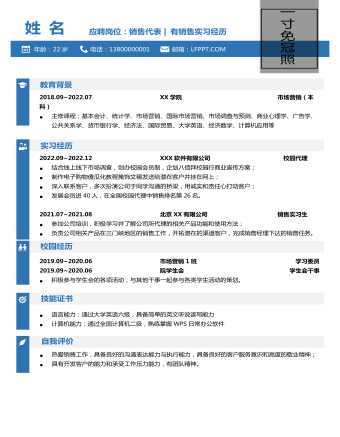
简约风求职简历应届生应聘销售工作
2022.09~2022.12 XXX软件有限公司 校园代理l 结合线上线下市场调查,创办校园会员制,企划八佰拜校园行商业宣传方案;l 制作电子购物傻瓜化教程掩饰文稿发送给潜在客户并挂在网上;l 深入联系客户,多次扮演公司于同学沟通的桥梁,用诚实和责任心打动客户;l 发展会员进40人,在全国校园代理中销售排名第26名。l 参加公司培训,积极学习并了解公司所代理的相关产品功能和使用方法;l 负责公司相关产品在三门峡地区的销售工作,开拓潜在的渠道客户,完成销售经理下达的销售任务。
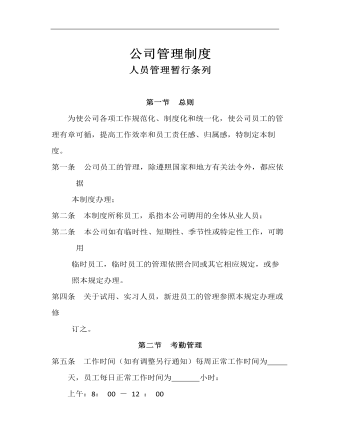
【通用】公司通用管理制度
第一节 总则为使公司各项工作规范化、制度化和统一化,使公司员工的管理有章可循,提高工作效率和员工责任感、归属感,特制定本制度。第一条 公司员工的管理,除遵照国家和地方有关法令外,都应依据本制度办理;第二条 本制度所称员工,系指本公司聘用的全体从业人员;第二条 本公司如有临时性、短期性、季节性或特定性工作,可聘用临时员工,临时员工的管理依照合同或其它相应规定,或参照本规定办理。第四条 关于试用、实习人员,新进员工的管理参照本规定办理或修订之。第二节 考勤管理第五条 工作时间(如有调整另行通知)每周正常工作时间为 天,员工每日正常工作时间为 小时:上午:8: 00 - 12 : 00 下午:13 : 00 - 18 : 00 第六条 所有员工必须严格遵守公司考勤制度,实行打卡签到制度。第七条 迟到、早退、旷工1. 员工均需按时上、下班,工作时间8:00开始后半小时内到班者为迟到,超过30分钟以上者,按旷工半日论处。2. 工作时间下班前半小时内下班者为早退,早退一次安旷工处理;3. 员工当月内迟到、早退合计每三次以旷工一日论;4. 无故迟到超过半小时者以旷工半日论;5. 无故提前半小时以上下班者,以旷工半日论;6. 未经请假或假满未经续假而擅自不到职以旷工论处。7. 员工旷工,不发当日薪资,并扣除月度奖金和季度奖金。8. 连续旷工三日或全月累计旷工六日或一年累计旷工达十二日者,予以除名,不发给资遣费。第八条 请假制度事假和病假,必须提前准备好假条,由负责人签字方可生效,电话请假得到许可后,假后要及时补上假条并找负责人签字。1. 病假员工须于上班开始的前一个小时内,即 7 :00 - 8 :00前致电负责人,请假一天以上的,病愈上班后须补假,并向行政部出示县级以上医院就诊证明。2. 事假2.1 一般性事假需提前一天以上告知相关负责人,并及时办理请假手续;2.2 紧急突发事情必须由本人,不得委托他人告知负责人,经负责人核准,方可离开工作岗位,否则按旷工论处。事假期间不计发工资。(注:每个员工每季度只有一次紧急事假,请假时间在2天以内并认真履行各项手续的,可以不予以扣罚工资)第九条 休假制度按国家规定,员工除星期日休息外,还享有以下有薪假日:元 旦(3天)、春节(7天)、劳动节(3天)、端午节(3天)、中秋节(3天)和国庆节(3天),由于业务需要,公司可临时安排员工于法定的公休日、休假日照常上班。
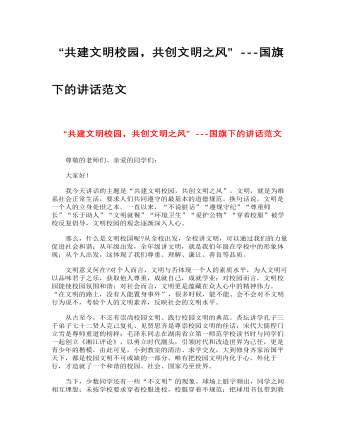
“共建文明校园,共创文明之风”---国旗下的讲话范文
我今天讲话的主题是“共建文明校园,共创文明之风”。文明,就是为维系社会正常生活,要求人们共同遵守的最基本的道德规范。换句话说,文明是一个人的立身处世之本。一直以来,“不说脏话”“遵规守纪”“尊重师长”“乐于助人”“文明就餐”“环境卫生”“爱护公物”“穿着校服”被学校反复倡导,文明校园的观念逐渐深入人心。 那么,什么是文明校园呢?从全校出发,全校讲文明,可以通过我们的力量促进社会和谐;从年级出发,全年级讲文明,就是我们年级在学校中的形象体现;从个人出发,这体现了我们尊重、理解、谦让、善良等品质。 文明意义何在?对个人而言,文明与否体现一个人的素质水平,为人文明可以品味君子之乐,获取他人尊重,成就自己,成就学业;对校园而言,文明校园能使校园氛围和谐;对社会而言,文明更是蕴藏在众人心中的精神伟力。“在文明的路上,没有人能置身事外”,很多时候,能不能、会不会对不文明行为说不,考验个人的文明素养,反映社会的文明水平。 从古至今,不乏有崇尚校园文明、践行校园文明的典范。杏坛讲学孔子三千弟子七十二贤人克己复礼、见贤思齐是尊崇校园文明的佳话;宋代大儒程门立雪是尊师重道的榜样;毛泽东同志在湖南省立第一师范学校读书时与同学们一起创立《湘江评论》,以勇立时代潮头,引领时代和改造世界为己任,更是青少年的楷模。由此可见,小到教室的清洁、求学交友,大到修身齐家治国平天下,都是校园文明不可或缺的一部分。唯有把校园文明内化于心,外化于行,才造就了一个和谐的校园、社会、国家乃至世界。
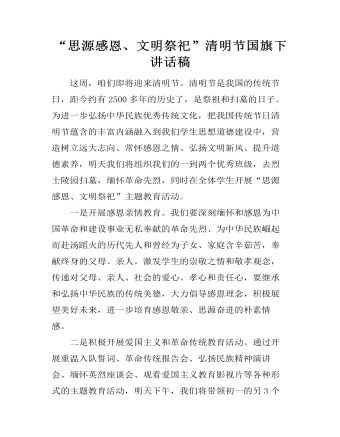
“思源感恩、文明祭祀”清明节国旗下讲话稿
这周,咱们即将迎来清明节。清明节是我国的传统节日,距今约有2500多年的历史了,是祭祖和扫墓的日子。为进一步弘扬中华民族优秀传统文化,把我国传统节日清明节蕴含的丰富内涵融入到我们学生思想道德建设中,营造树立远大志向、常怀感恩之情、弘扬文明新风、提升道德素养,明天我们将组织我们的一到两个优秀班级,去烈士陵园扫墓,缅怀革命先烈,同时在全体学生开展“思源感恩、文明祭祀”主题教育活动。一是开展感恩亲情教育。我们要深刻缅怀和感恩为中国革命和建设事业无私奉献的革命先烈、为中华民族崛起而赴汤蹈火的历代先人和曾经为子女、家庭含辛茹苦,奉献终身的父母、亲人。激发学生的崇敬之情和敬孝观念,传递对父母、亲人、社会的爱心、孝心和责任心,要继承和弘扬中华民族的传统美德,大力倡导感恩理念,积极展望美好未来,进一步培育感恩敬亲、思源奋进的朴素情感。
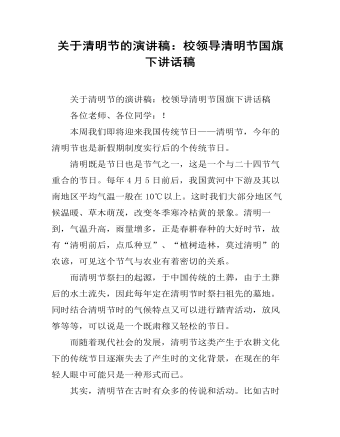
关于清明节的演讲稿:校领导清明节国旗下讲话稿
关于清明节的演讲稿:校领导清明节国旗下讲话稿各位老师、各位同学:!本周我们即将迎来我国传统节日——清明节,今年的清明节也是新假期制度实行后的个传统节日。清明既是节日也是节气之一,这是一个与二十四节气重合的节日。每年4月5日前后,我国黄河中下游及其以南地区平均气温一般在10℃以上。这时我们大部分地区气候温暖、草木萌茂,改变冬季寒冷枯黄的景象。清明一到,气温升高,雨量增多,正是春耕春种的大好时节,故有“清明前后,点瓜种豆”、“植树造林,莫过清明”的农谚,可见这个节气与农业有着密切的关系。而清明节祭扫的起源,于中国传统的土葬,由于土葬后的水土流失,因此每年定在清明节时祭扫祖先的墓地。同时结合清明节时的气候特点又可以进行踏青活动,放风筝等等,可以说是一个既肃穆又轻松的节日。而随着现代社会的发展,清明节这类产生于农耕文化下的传统节日逐渐失去了产生时的文化背景,在现在的年轻人眼中可能只是一种形式而已。
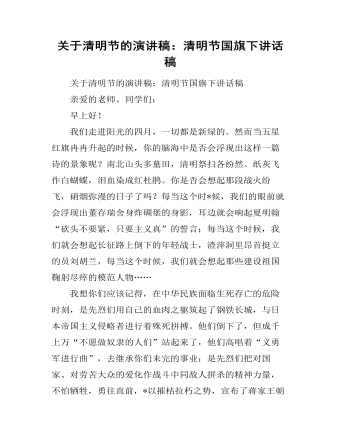
关于清明节的演讲稿:清明节国旗下讲话稿
关于清明节的演讲稿:清明节国旗下讲话稿亲爱的老师、同学们:早上好!我们走进阳光的四月,一切都是新绿的。然而当五星红旗冉冉升起的时候,你的脑海中是否会浮现出这样一篇诗的景象呢?南北山头多墓田,清明祭扫各纷然。纸灰飞作白蝴蝶,泪血染成红杜鹃。你是否会想起那段战火纷飞,硝烟弥漫的日子了吗?每当这个时*候,我们的眼前就会浮现出董存瑞舍身炸碉堡的身影,耳边就会响起夏明翰“砍头不要紧,只要主义真”的誓言;每当这个时候,我们就会想起长征路上倒下的年轻战士,渣滓洞里昂首挺立的员刘胡兰,每当这个时候,我们就会想起那些建设祖国鞠躬尽瘁的模范人物……我想你们应该记得,在中华民族面临生死存亡的危险时刻,是先烈们用自己的血肉之躯筑起了钢铁长城,与日本帝国主义侵略者进行着殊死拼搏。他们倒下了,但成千上万“不愿做奴隶的人们”站起来了,他们高唱着“义勇军进行曲”,去继承你们未完的事业;是先烈们把对国家、对劳苦大众的爱化作战斗中同敌人拼杀的精神力量,不怕牺牲,勇往直前,*以摧枯拉朽之势,宣布了蒋家王朝的灭亡,建立了人民当家作主的新中国

人教版高中历史必修3文艺复兴和宗教改革教案
三、宗教改革:1、背景:(1)文艺复兴的影响。文艺复兴中,人文主义学者尽管对宗教保持较为温和的态度,但其以人为中心的思想极大地冲击了天主教的精神独裁,天主教的权威日益受到人们的怀疑。(2)天主教会对欧洲尤其是德意志的压榨。中世纪的天主教会对人民进行严密的精神统治,基督教信仰的核心是“原罪”和“灵魂救赎”,即人生下来就有罪,只有信仰上帝,跟随耶稣才能得救。就“灵魂救赎”而言,最初强调的是个人信仰的作用,后来,神学家们又加上了种种繁杂的宗教礼仪,而且必须得到神职人员的帮助,灵魂才能得救。在经济上,天主教会还是最大的封建主,占有大量的土地,并征收什一税,对各国人民大肆搜刮。罗马教廷每年从德意志搜刮的财富达30万古尔登(货币单位),相当于“神圣罗马帝国”皇帝每年税收额的20倍。德意志也成了被教会榨取最严重的地区,素有“教皇的乳牛”之称。
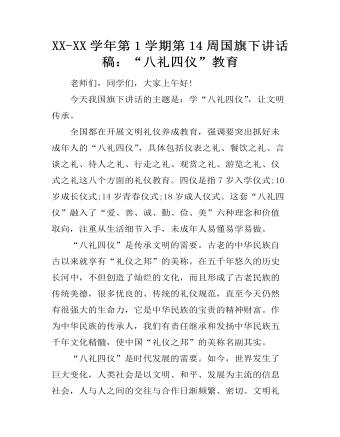
XX-XX学年第1学期第14周国旗下讲话稿:“八礼四仪”教育
老师们,同学们,大家上午好!今天我国旗下讲话的主题是:学“八礼四仪”,让文明传承。全国都在开展文明礼仪养成教育,强调要突出抓好未成年人的“八礼四仪”,具体包括仪表之礼、餐饮之礼、言谈之礼、待人之礼、行走之礼、观赏之礼、游览之礼、仪式之礼这八个方面的礼仪教育。四仪是指7岁入学仪式;10岁成长仪式;14岁青春仪式;18岁成人仪式。这套“八礼四仪”融入了“爱、善、诚、勤、俭、美”六种理念和价值取向,注重从生活细节入手,未成年人易懂易学易做。“八礼四仪”是传承文明的需要。古老的中华民族自古以来就享有“礼仪之邦”的美称。在五千年悠久的历史长河中,不但创造了灿烂的文化,而且形成了古老民族的传统美德,很多优良的、传统的礼仪规范,直至今天仍然有很强大的生命力,它是中华民族的宝贵的精神财富。

新人教版高中英语必修3Unit 1 Festivals and celebrations-Discovering Useful Structure教学设计
4.That was an experience that frightened everyone. →That was _____________________. 答案:1. taking 2. being discussed 3. in the reading room 4. a frightening experienceStep 6 The meaning and function of V-ing as the predicative动词-ing形式作表语,它通常位于系动词后面,用以说明主语“是什么”或“怎么样”一种表示主语的特质、特征和状态, 其作用相当于形容词; 另一种具体说明主语的内容, 即主语等同于表语, 两者可互换。The music they are playing sounds so exciting. 他们演奏的音乐听起来令人激动。The result is disappointing. 结果令人失望。Our job is playing all kinds of music. 我们的工作就是演奏各种音乐。Seeing is believing. 眼见为实。Step 7 Practice1. It is ________(amaze) that the boy is able to solve the problem so quickly.2. Buying a car is simply _______(waste) money. 3. Please stop making the noise—it’s getting ________(annoy). 4. complete the passage with the appropriate -ing form.La Tomatina is a festival that takes place in the Spanish town Bunol every August. I think many food festivals are __________ because people are just eating. however, this festival is _________ because people don't actually eat the tomatoes. Instead, they throw them at each other! the number of people ________ part in this tomato fight, can reach up to 20,000, and it is a very __________ fight that lasts for a whole hour. The _______ thing is how clean Bunol is after the tomatoes are washed away after the fight. this is because the juice form tomatoes is really good for making surfaces clean!答案:1. amazing 2. wasting 3. annoying4. boring interesting taking exciting amazing

新人教版高中英语必修3Unit 1 Festivals and Celebrations-Listening &Speaking&Talking教学设计
The theme of this section is “Talk about festival activities and festival experiences”.Festival and holiday is a relaxing and interesting topic for students. This part talks about the topic from the daily life of students’. In the part A ---Listening and Speaking, there are three conversations among different speakers from three countries(Japan, Rio and China), where the speakers are participating in or going to participate in the festivals and celebrations. So listening for the relationship among them is a fundamental task. Actually, with the globalization and more international communication, it is normal for Chinese or foreigners to witness different festivals and celebrations in or out of China. In the Conversation 1, a foreign reporter is interviewing a Japanese young girl who just had participated in the ceremony of the Coming-of-Age Day on the street and asking her feeling about the ceremony and the afterwards activities. Conversation 2, Chinese girl Li Mei is witnessing the Rio Carnival for the first time, and her friend Carla gives her some advice on the costumes which enables her to match with the carnival to have a good time. Conversation 3, a Chinese guide is showing a group of foreign visitors around the Lantern Festival and introducing the customs of the festival to them. The three conversations have a strong vitality and insert the festival and cultural elements from different countries. So perceiving the festivals and cultures from different countries is the second task. At the same time, the scripts also insert the targeted grammar --- v-ing as attributive and predicative, which students can perceive and experience in a real context and make a road for the further study. That is the third task. In the Part B--- Listening and Talking, the theme is “Talk about festival experience”, which is the common topic in our daily conversations. During the conversation, Song Lin, a Chinese student, asked Canadian friend Max about how to spend Christmas. In the conversation, Song Lin talked about experience and the feelings during the Chinese Spring Festival, during which there are not only some enjoyable things but some unpleasant things. After the listening, perhaps students find there are some similarities between Christmas and the Chinese Spring Festival as there are some differences in the origins and celebrations. For example, people always visit friends and relatives, decorate their houses, have a big dinner together, chat and give presents to each other.

新人教版高中英语必修3Unit 1 Festivals and Celebrations-Reading for writing教学设计二
Step 3 Analyzing article structureActivity 31. Teachers raise questions to guide students to analyze the chapter structure of this diary and think about how to describe the festival experience. (1)What should be included in the opening/body/closing paragraph(s)?(2)How did the writer arrange his/her ideas?(3)What kind of interesting details did the writer describe?(4)How did the writer describe his/her feelings/emotions during the event?2. Students read and compare the three sentence patterns in activity 2. Try to rewrite the first paragraph of the diary with these three sentence patterns. After that, students exchange corrections with their partners. Such as:●This was my first time spending three days experiencing the Naadam Festival in China’s Inner Mongolia Autonomous Region and it was an enjoyable and exciting experience. ●I'll never forget my experience at the Naadam Festival because it was my first time to watch the exciting Mongolian games of horse racing, wrestling, and archery so closely. ●I'll always remember my first experience at the Naadam Festival in China’s Inner Mongolia Autonomous Region because it was so amazing to spend three days witnessing a grand Mongolian ceremony. Step 4 Accumulation of statementsActivity 41. Ask the students to read the diary again. Look for sentences that express feelings and emotions, especially those with the -ing form and the past participle. Such as:● …horse racing, wrestling, and archery, which are all so exciting to watch. ● some amazing performances● I was surprised to see…● I was a little worried about. . . ● feeling really tiredOther emotional statements:●I absolutely enjoyed the archery, too, but the horse races were my favourite part. ●I'm finally back home now, feeling really tired, but celebrating Naadam with my friend was totally worth it. ●He invited me back for the winter to stay in a traditional Mongolian tent and cat hot pot. I can’t wait!2. In addition to the use of the -ing form and the past participle, the teacher should guide the students in the appreciation of these statements, ask them to memorize them, and encourage them to use them reasonably in writing practice.

新人教版高中英语必修3Unit 3 Diverse Cultures-Discovering Useful Structure教学设计
Step 4 PracticeRead the conversation. Find out which words have been left out.Justin: Linlin, I’m going to Guizhou Province next month. I’m super excited! Any recommendations for places to visit?Linlin: Wow, cool! Guizhou is a province with a lot of cultural diversity. Places to visit...well, definitely the Huangguoshu Waterfall first.Justin: What’s special about the waterfall?Linlin: Well, have you ever heard of the Chinese novel Journey to the West ?Justin: Yes, I have. Why ?Linlin: In the back of the waterfall, you will find a cave, which is the home of the Monkey King.Justin: Really? Cool! I’ll definitely check it out.Linlin:And I strongly recommend the ethnic minority villages. You’ll find Chinese culture is much more diverse than you thought.Justin:Sounds great, thanks.Answers:Justin: Linlin, I’m going to Guizhou Province next month. I’m super excited! Do you have any recommendations for places to visit?Linlin: Wow, that’s cool! Guizhou is a province with a lot of cultural diversity. What are some places to visit in Guizhou ? Well, definitely the Huangguoshu Waterfall is the first place to visit in Guizhou Province.Justin: What’s special about the waterfall?Linlin: Well, have you ever heard of the Chinese novel Journey to the West ?Justin: Yes, I have heard of the Chinese novel Journey to the West . Why do you ask if I have heard of the Chinese novel Journey to the West?Linlin: In the back of the waterfall, you will find a cave, which is the home of the Monkey King from Journey to the West.Justin: That’s really true? It’s Cool! I’ll definitely check it out.Linlin:And I strongly recommend the ethnic minority villages on your trip to Guizhou Province. You’ll find Chinese culture is much more diverse than you thought it was.Justin:This all sounds great, thanks.

新人教版高中英语必修3Unit 3 Diverse Cultures-Reading for Writing教学设计
The topic of this part is “Describe a place with distinctive cultural identity”.This section focuses on Chinese culture by introducing Chinatown, whose purpose is to show the relationship between the Chinese culture and American culture. The Chinese culture in Chinatown is an important part of American culture. Chinatown is an important window of spreading Chinese culture and the spirit homeland of oversea Chinese, where foreigners can experience Chinese culture by themselves.Concretely, the title is “Welcome to Chinatown!”, from which we can know that the article aims at introducing Chinatown. The author used the “Introduction--Body Paragraph--Conclusion” to describe the people, language, architecture, business, famous food and drinks and people’s activities, which can be a centre for Chinese culture and shows its unique charm.1. Read quickly to get main idea; read carefully to get the detailed information.2. Learn the characteristics of writing and language.3. Learn to introduce your own town according to the text.4. Learn to correct others’ writing.1. Learn the characteristics of writing and language.2. Learn to introduce your own town according to the text.Step 1 Lead in ---Small talkIn the reading part, we mentioned the Chinatown of San Francisco. How much do you know about Chinatown of San Francisco ?Chinatown is a main living place for Chinese immigrants, where you can see many Chinese-style buildings, costumes, operas, restaurants, music and even hear Chinese.Step 2 Before reading ---Predict the contentWhat is the writer’s purpose of writing this text ? How do you know ?From the title(Welcome to Chinatown) and some key words from the text(tourist, visit, visitors, experience), we can know the purpose of the text is to introduce Chinatown and show the relationship between Chinese culture and American culture.

新人教版高中英语必修3Unit 4 Space Exploration-Discovering Useful Structure教学设计
The theme of the section is “Describe space facts and efforts to explore space”. Infinitives are one of non-finite verbs, as the subjects, objects, predicative, attributes and adverbials. This unit is about space exploration, which is a significant scientific activity, so every scientific activity has strong planning. Therefore, using the infinitives to show its purpose, explanations or restrictions is the best choice.1. Learn the structure, functions and features of infinitives.2. Learn to summarize some rules about infinitives to show purpose and modify.3. Learn to use infinitives in oral and writing English. 1. Learn the structure, functions and features of infinitives.2. Learn to summarize some rules about infinitives to show purpose and modify.3. Learn to use use infinitives in oral and writing English.Step 1 Lead in---Pair workLook at the following sentences and focus on the italicized infinitives. In pairs, discuss their functions. 1. I trained for a long time to fly airplanes as a fighter pilot..(作目的状语)2. As we all know, an astronaut needs to be healthy and calm in order to work in space..(作目的状语)3. First of all, you must be intelligent enough to get a related college degree..(作目的状语)4. Some scientist were determined to help humans realise their dream to explore space..(作定语)5. On 12 April 1961, Yuri Gagarin became the first person in the world to go into space..(作定语)Summary:1. 不定式的结构:to+do原形。2. 分析上面的句子,我们知道在描述太空探索时,动词不定式不仅可以用来表目的,还可以用来作定语,表修饰。

新人教版高中英语必修3Unit 5 The Value of Money- Discovering Useful Structure教学设计
Step 3 Meaning1. 过去将来时表示从过去某一时间来看将要发生的动作或存在的状态, 常用在宾语从句中。一般由“would/should +动词原形”构成。She hoped that they would meet again someday. 她希望将来有一天他们能再见面。2. was/were going to+动词原形: 表示过去将要发生或很有可能发生的动作, 常用于口语中, 表示预言、意图或者打算等。He was going to start work the following week. 他打算下星期开始工作。3. was/were about to do: 常用来表示即将发生的动作, “刚要/正要做……”。注意该结构不与任何时间状语连用。I felt that something terrible was about to happen. 我感到某种可怕的事情即将发生。4.was/were to do: 表示“曾计划做某事”, 如果表示“本来计划做某事, 动作没实现”, 则需用 “was/were to have done”。She said she was to have told me about the accident. 她说她本来想告诉我关于事故的事。5.Start, go, come, leave, see, meet等动词的过去进行时: 表示就过去某一时刻而言即将发生的动作。She was coming later. 她随后就来。I had just put on my overcoat and was leaving to visit a friend of mine. 我刚穿上外套要去看我的一个朋友。

